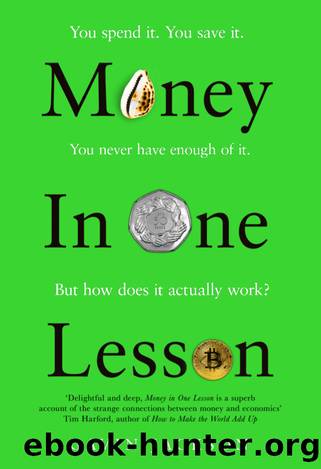Money in One Lesson by Gavin Jackson

Author:Gavin Jackson [Jackson, Gavin]
Language: eng
Format: epub
Tags: Non-Fiction, Currency, Economics
ISBN: 9781529051872
Publisher: Pan Macmillan UK
Published: 2021-11-26T17:00:00+00:00
9. How do we save money?
In 2019 protests rocked Chile.1 The causes were diffuse: originally sparked by a 30-peso rise in the price of rush hour metro tickets in the capital, Santiago, the set of grievances quickly broadened out. An estimated million people took to the streets demanding a wholesale change in how the country operated. Some adopted the slogan âItâs not about 30 pesos, itâs about 30 yearsâ.2
The protests marked three decades since the transition to democracy following the military dictatorship of General Pinochet.3 Optimism had since faded. Economic growth had slowed, inequality was high and the expectations of the countryâs growing middle class had been routinely frustrated.4 Towards the top of the list of grievances, however, was something that rarely provokes such intense feelings: pensions.5 The Pinochet-era system, now in its fourth decade, had failed to ensure Chileans saved as much for their retirement as anticipated, leaving thousands trapped in old age poverty.
The problems with Chileâs pension system were a reflection of a common challenge facing all of us: how do we save for the future? How do we make sure that we will have enough to survive when or if we can no longer work? How can you transfer money you get today to when you will really need it and be sure it will still be there?
In the early 1980s Chile had introduced a system of individual pension saving accounts that earned plaudits from the World Bank and became the model for similar reforms6 across poorer countries. Previously Chile had only used a pay-as-you-go system: workers were meant to contribute throughout their lives, and these funds were immediately transferred to the retired. When the currently contributing workers reached their retirement age, the next generation would bear the responsibility for funding their pensions.7 With little connection between the amount workers paid in and the amount they received, most would pay only the minimum â or avoid it altogether. It became more and more expensive for the few who could not avoid contributing to support the rest.
José Piñera, the Minister of Labour under Pinochet, oversaw the privatization of this system. He was part of a group that became known as the âChicago Boysâ8 â Chilean students who had studied economics at the University of Chicago under Milton Friedman and brought back ideas for reforming the countryâs economy. Piñera said that reading Friedmanâs classic Capitalism and Freedom as a student had changed his life. That experience would, in turn, change his country and become an experiment, closely watched by the rest of the world, into whether financial markets and a purely private pension system could be enough to save for the future.9
Pinochetâs brutal regime turned to the Chicago Boys to provide his anti-communist military coup with an economic vision, restoring the nation after the hyperinflation during the prior democratically elected socialist government.10 For their part, while sympathetic to anti-communism, the Chicago Boys also saw in the regime a chance to transform the economy along âscientificâ and âtechnicalâ grounds absent political pressure.
Download
This site does not store any files on its server. We only index and link to content provided by other sites. Please contact the content providers to delete copyright contents if any and email us, we'll remove relevant links or contents immediately.
International Integration of the Brazilian Economy by Elias C. Grivoyannis(106938)
The Radium Girls by Kate Moore(12004)
Turbulence by E. J. Noyes(8009)
Nudge - Improving Decisions about Health, Wealth, and Happiness by Thaler Sunstein(7682)
The Black Swan by Nassim Nicholas Taleb(7091)
Rich Dad Poor Dad by Robert T. Kiyosaki(6581)
Pioneering Portfolio Management by David F. Swensen(6275)
Man-made Catastrophes and Risk Information Concealment by Dmitry Chernov & Didier Sornette(5982)
Zero to One by Peter Thiel(5770)
Secrecy World by Jake Bernstein(4729)
Millionaire: The Philanderer, Gambler, and Duelist Who Invented Modern Finance by Janet Gleeson(4449)
The Age of Surveillance Capitalism by Shoshana Zuboff(4270)
Skin in the Game by Nassim Nicholas Taleb(4225)
The Money Culture by Michael Lewis(4175)
Bullshit Jobs by David Graeber(4167)
Skin in the Game: Hidden Asymmetries in Daily Life by Nassim Nicholas Taleb(3980)
The Dhandho Investor by Mohnish Pabrai(3745)
The Wisdom of Finance by Mihir Desai(3721)
Blockchain Basics by Daniel Drescher(3568)
